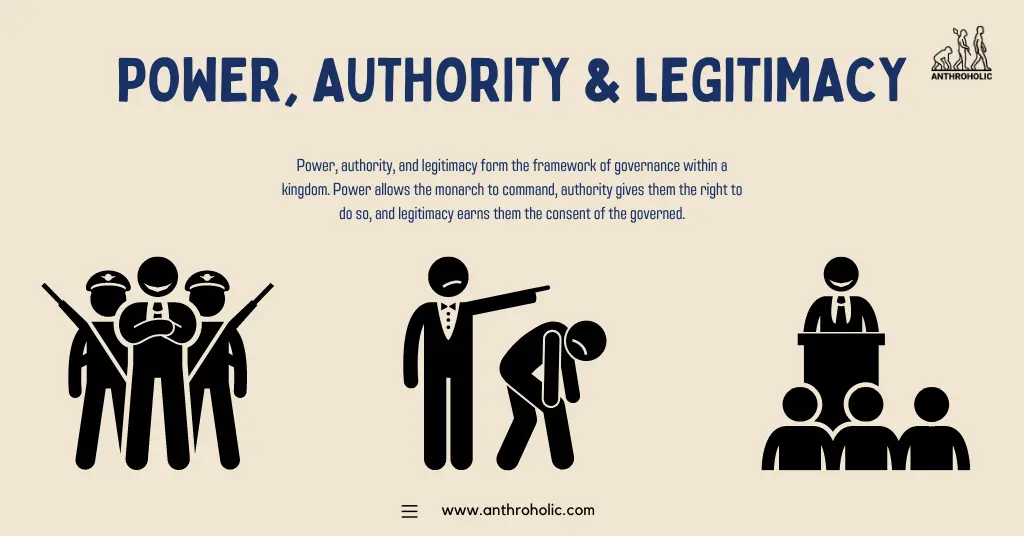AI Answer Evaluation Platform Live Now. Try Free Answer Evaluation Now
Power Authority and Legitimacy
Before we delve into the meat of our discourse, it is essential to understand these pivotal concepts—Power, Authority, and Legitimacy. In the context of political science and sociology, these concepts are the fundamental building blocks that constitute the edifice of a kingdom. They’re interwoven into the fabric of governance, dictating the functionality, effectiveness, and overall existence of a society.

Power
Power is a term that bears multiple interpretations, especially within the framework of a kingdom. Essentially, it refers to the ability or capacity to make others do what one wants, even against their will.
The Dimensions of Power
Power within a kingdom typically manifests in three main dimensions:
- First Dimension: This is observable power, as seen in decision-making scenarios and policy development. It usually involves a clear conflict of interests and the use of resources to win the conflict.
- Second Dimension: This is less conspicuous, focusing more on the power to control the agenda. In other words, it involves determining what issues are up for discussion and which ones are not.
- Third Dimension: The most subtle and possibly the most influential form of power. It revolves around shaping desires and perceptions, making people accept situations contrary to their interests as normal.
Authority
Unlike power, which can exist without consent, authority within a kingdom requires the voluntary submission or recognition by subjects. Authority is the right to exercise power, and it is usually legitimized by a recognized structure or institution.
Types of Authority
Sociologist Max Weber outlined three distinct types of authority:
- Traditional Authority: In this form of authority, power is inherited or passed down generations, based on cultural customs, practices, or established norms.
- Charismatic Authority: Here, authority is based on an individual’s charisma or personal appeal. Leaders are followed due to their extraordinary qualities or achievements that inspire others.
- Legal-Rational Authority: This type of authority is based on established laws, rules, and procedures. Officials are elected or appointed to their positions based on a clear, rational process outlined in the kingdom’s legal framework.
Legitimacy
Legitimacy is the recognition, acceptance, and justification of power or authority. It plays a crucial role in the stability and effectiveness of a kingdom. When power or authority is seen as legitimate, it’s less likely to face opposition and more likely to influence or control effectively.
Factors Determining Legitimacy
Several factors play a role in determining the legitimacy of power or authority within a kingdom:
- Consent: The governed must express agreement with those in power for the power to be deemed legitimate.
- Justification: The authority must have a reasonable and fair basis.
- Institutionalization: Power is often seen as legitimate when it is exercised within an established institution with recognized rules and norms.
- Effectiveness: The ability to effectively provide services and maintain order contributes to the perception of legitimacy.
The Role of Power, Authority, and Legitimacy in Establishing a Kingdom
The establishment of a kingdom relies heavily on the concepts of power, authority, and legitimacy. These three factors intertwine to form a solid foundation for the governance and structure of a kingdom.
Power and the Emergence of a Kingdom
The formation of a kingdom often starts with power. It is the potential or capacity to influence or control others, often against their will. The foundation of many kingdoms is marked by the assertion of power—through conquests, alliances, or manipulation.
The ability to project and wield power can result in control over a geographic area and its inhabitants. However, power alone is unstable; it can lead to continuous strife and struggle, and does not necessarily create a sustainable or effective kingdom.
Authority and the Structure of a Kingdom
While power may initiate the creation of a kingdom, authority provides the structure. It gives the ruler the right to exercise power, acknowledged and accepted by the subjects.
In the context of a kingdom, authority is generally traditional, passed down from one generation to another. However, some kingdoms may incorporate elements of legal-rational authority, with systems in place to regulate succession and limit the monarch’s power. This structure of authority provides a consistent and systematic way to exercise power, contributing to the stability and longevity of the kingdom.
Legitimacy and the Sustainability of a Kingdom
The long-term sustainability of a kingdom lies in the legitimacy of the ruler’s power and authority. Legitimacy elicits the willing submission of subjects to the ruler, reducing the likelihood of rebellion or dissatisfaction. A ruler seen as legitimate is also more likely to command loyalty, fostering unity within the kingdom.
In a kingdom, legitimacy often comes from traditional authority and the consistent delivery of services, such as protection, justice, and welfare. If the ruler is successful in meeting these needs, it reinforces their legitimacy.
Power, Authority, and Legitimacy: Case Study of a Kingdom
For a concrete understanding of these concepts, let’s consider the Kingdom of England during the reign of King Henry VIII.
Power
King Henry VIII is well-known for his assertion of power. His reign was marked by significant military campaigns, including wars against France and Scotland. These ventures projected his power both within and beyond his kingdom, solidifying his control.
Authority
Henry VIII’s authority primarily stemmed from his inherited position as king—a classic example of traditional authority. However, he also established legal-rational authority by breaking from the Roman Catholic Church and declaring himself as the head of the Church of England—a significant move that further consolidated his authority.
Legitimacy
The legitimacy of Henry VIII’s rule is a more complex issue. His drastic religious reforms and marital controversies sparked considerable discontent among his subjects and the European nobility. However, his success in establishing a unified Church of England and his efforts in expanding English territory ultimately contributed to his perceived legitimacy.
This case study underscores the importance of power, authority, and legitimacy in a kingdom. Without these components working in harmony, the stability and longevity of a kingdom are at risk.
Power, Authority, and Legitimacy: Challenges and Complexities
While power, authority, and legitimacy are crucial for the functioning of a kingdom, they also come with inherent challenges and complexities.
Power Dynamics
Power is not static—it ebbs and flows. As a kingdom evolves, power dynamics can shift dramatically, leading to potential instability. This could result from external factors such as wars or internal issues such as succession crises.
Authority Disputes
Disputes over authority can cause significant turmoil within a kingdom. This can happen during succession disputes, or when there’s a disconnect between traditional authority and the evolving norms and expectations of the kingdom’s inhabitants.
Legitimacy Questions
A ruler’s legitimacy can be questioned due to various reasons such as the ruler’s incompetence, gross violation of societal norms, or inability to provide necessary services. This could lead to rebellions or revolutions, destabilizing the kingdom.
Conclusion
Power, authority, and legitimacy form the framework of governance within a kingdom. Power allows the monarch to command, authority gives them the right to do so, and legitimacy earns them the consent of the governed. Understanding these concepts offers valuable insight into the social dynamics within a kingdom and informs the strategies used to maintain order and stability.



